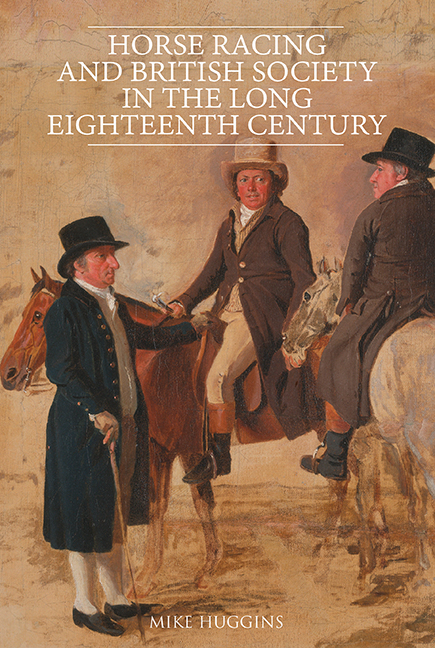Book contents
- Frontmatter
- Contents
- List of Illustrations
- List of Tables
- Acknowledgements
- Further Matter
- Introduction: Setting the Scene
- 1 The ‘Race Week’ in British Social Life
- 2 The Secret World of Wagering
- 3 Horse Racing and British Politics
- 4 Racing and its Rules
- 5 Running the Race Meeting
- 6 The Racehorse, its Ownership and Breeding
- 7 Vital Professionals: Jockeys, Grooms and Trainers
- Conclusion
- Bibliography
- Index
3 - Horse Racing and British Politics
Published online by Cambridge University Press: 28 June 2018
- Frontmatter
- Contents
- List of Illustrations
- List of Tables
- Acknowledgements
- Further Matter
- Introduction: Setting the Scene
- 1 The ‘Race Week’ in British Social Life
- 2 The Secret World of Wagering
- 3 Horse Racing and British Politics
- 4 Racing and its Rules
- 5 Running the Race Meeting
- 6 The Racehorse, its Ownership and Breeding
- 7 Vital Professionals: Jockeys, Grooms and Trainers
- Conclusion
- Bibliography
- Index
Summary
IN 1767 the London Chronicle made explicit what it saw as a close relationship between horse racing, politics and law making, arguing that:
I've heard there is a neat alliance,
‘Twixt ev'ry liberal art and science;
So the same art we may trace in,
Legislation and horse racing.
Racing was far more than ‘amusement’, ‘diversion’, ‘ease’, ‘pleasure’, ‘pastime’, ‘play’ or ‘solace’, or a site for competition between horses, jockeys, grooms, trainers and racehorse owners for prize money, income or status. Horse racing was also regularly affected by politics and parliamentary concerns, as in the racing legislation of 1740 and 1745. In turn, racing regularly intruded on political, social and cultural themes, especially during times of rapid and substantial change, though there were also continuities in racing's complex interconnections with political life.
Four key arguments run through this chapter. First, race meetings and associated wagering could be pleasurable leisure activities for some British rulers and their sons, and a route to courtly favour, yet they could also be a potential focus for youthful royal rebellion, the garnering of oppositional support, or expression of Jacobite and other political discontent and subversion. Second, many Members of Parliament had a keen interest in the turf, yet it could distract them from active engagement in Westminster politics, and at times racing attracted parliamentary legislation. Third, attendance and support for race meetings by eighteenth-century politicians usually helped gain patronage and electoral advantage, and assisted networking. Finally, discourse around racing and politics were contemporary tropes in newspapers and elite correspondence, appealing to landed interests and elite sociability, so the deeply politicized stories that the popular press disseminated sometimes picked up on racing imagery.
Given the importance of politics it is surprising that this complex relationship has hitherto been all but ignored by historians, even though the role of the coffee house in popular and conspiratorial politics, and the gaming clubs of the political elite, have been carefully studied. There are rare exceptions. Richard Nash has pointed out that gifts of horses could at times signal diplomatic messages between international allies, while debates over breeding, continuity and economic determinism were simultaneously linked to royal dynasties and stallions. Carl Cone's 1975 study of the importance of racing connections to accounts of the two Rockingham ministries of 1765–66 and 1782 also treats seriously the relationship between racing and politics.
- Type
- Chapter
- Information
- Horse Racing and British Society in the Long Eighteenth Century , pp. 122 - 152Publisher: Boydell & BrewerPrint publication year: 2018



